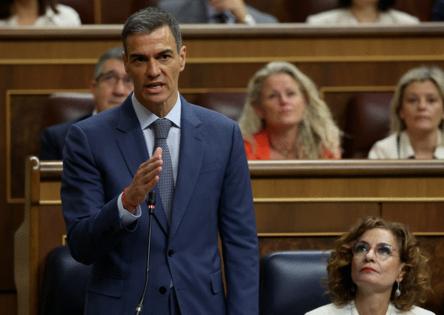Sanchez puts NATO's Trump plan at risk by opposing 5% goal
Published in News & Features
MADRID — The problems piling up for Prime Minister Pedro Sanchez in Spain are threatening to spill into next week’s NATO summit, with potentially drastic consequences for the rest of the European Union.
The 53-year-old premier has been under fire at home, with allegations of graft in his inner circle putting his minority coalition under strain. As he seeks to reclaim the initiative, he’s emerged as the only leader from the North Atlantic Treaty Organization refusing to sign up to a new target for spending 5% of GDP on defense.
That may help to shore up his base, appealing to anti-war factions in his Socialist party and his left-wing coalition partners. But it poses a major problem for NATO Secretary General Mark Rutte’s efforts to hold the alliance together and demonstrate to Donald Trump that his European allies are prepared to take their own security seriously.
Rutte has spent months preparing the ground for the summit with one sole objective: to secure Trump’s renewed commitment to defend his European allies should they come under at attack. The center of his pitch to the U.S. leader was the new spending target, conceived to tackle head on Trump’s longstanding gripe that European nations have been free-riding on the U.S. defense budget for decades.
White House spokeswoman Karoline Leavitt, when asked about Sanchez’s refusal to agree on the new spending target, said that Trump “wants to see all European countries pay their fair share and meet that 5%” threshold, “including Spain.”
For the E.U., the stakes could barely be greater. Russia’s army is inching forward in Ukraine and the countries on Europe’s eastern flank are frantically shoring up their own defenses against a new Russian attack.
The new spending targets signal the intentions of E.U. members to prepare to fend off an potential aggressor themselves. But that work will take years, and until then, they are reliant on the U.S. security guarantee — and Vladimir Putin’s conviction that it still holds.
Sanchez is coming under heavy pressure to back down, people familiar with the state of the talks told Bloomberg earlier on Thursday.
“Spain cannot commit to a specific spending target in terms of GDP at this summit,” Sanchez wrote in a letter to Rutte Thursday. “It’s not necessary,” would “slow down” growth while benefiting foreign industries and it’s “incompatible” with the Spanish welfare state.
The 5% target has been a key demand of the U.S. and has garnered support from 31 out of 32 members, albeit somewhat reluctantly in a few cases. But Sanchez’s ability to push for such a increase has been significantly undermined by an influence-peddling scandal involving two former advisers that has engulfed his party and imperiled his political future.
Even before the latest scandal, Sanchez had been pushing back on the higher targets, and he reiterated some longstanding arguments in his letter to Rutte.
The Spanish premier says that the new targets would place a massive burden on a country like Spain, which already has a high level of public debt. Delivering on those commitments would force him either to cut welfare spending — a central plank of his political project — or increase taxes or borrowing.
Most of Sanchez’s political allies in Spain also oppose increased defense spending and the prime minister previously said he would boost the military budget from 1.4% of GDP to 2% by the end of the year but would do so by reshuffling existing funding. That avoids a vote in parliament, where he lacks a clear majority.
Spain hasn’t approved a budget since he snatched a narrow victory at the last election in 2023 and his chances of doing so now are retreating.
“This term is politically dead,” Ione Belarra, a former Sanchez minister and leader of his junior coalition partner Podemos, said on Wednesday.
The spending framework that Sanchez is being asked to sign up to offers plenty of wiggle room — the targets most likely won’t apply until 2035, there are a no intermediate milestones, and a policy review in 2029 offers a chance for a potential fudge when, Trump will have completed his second term.
But a public fight over the principle of increasing defense expenditure is the sort of move that could help him to change the topic and wriggle out out of a fix. Standing up to the U.S.-led alliance and the demands of the Trump White House is the sort of posture that may play well with Sanchez’s Socialist party base.
The Spanish prime minister said in his letter that he would favor a formula allowing NATO to “preserve the 5% target” for “those allies that need it or want to pursue it,” a position that may upset countries closer to the Russian border. Spain, Sanchez said, is willing to go up to 2.1%.
-------------
—With assistance from Rodrigo Orihuela.
©2025 Bloomberg L.P. Visit bloomberg.com. Distributed by Tribune Content Agency, LLC.







Comments